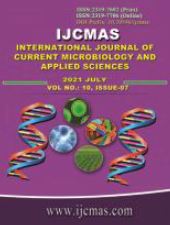


 National Academy of Agricultural Sciences (NAAS)
National Academy of Agricultural Sciences (NAAS)

|
PRINT ISSN : 2319-7692
Online ISSN : 2319-7706 Issues : 12 per year Publisher : Excellent Publishers Email : editorijcmas@gmail.com / submit@ijcmas.com Editor-in-chief: Dr.M.Prakash Index Copernicus ICV 2018: 95.39 NAAS RATING 2020: 5.38 |
Organic agriculture is a holistic production management system which promotes and enhances ecosystem health, including biological cycles and soil biological activity. Application of different organic manures in combination with inorganic fertilizers to wheat crop might give a substitute under pot condition. A pot experiment is conducted during 2012-13with the objective to find out best combination and type of organic and inorganic fertilizer for wheat (Triticum aestivum) production. The experiment was laid out with three replication. The treatments were: control (T1, NPK), 100+60+40 NPK Kg/ha+5ton/ha Farmyard manure (T2), 100+60+40 NPK Kg/ha+5 ton/ha Vermicompost (T3), 100+60+40 NPK Kg/ha+5ton/ha Paddy husk (T4), 100+60+40 NPK Kg/ha+2.5 ton/ha Farmyard manure+2.5 ton/ha Vermicompost (T5). After 60days spike length (cm), root length (cm) and number of spikelet’s recorded. The soil enzymes dehydrogenase, urease, acid and alkaline phosphatase activity were measured. Enzyme activity in soil is regulated by pH and microbial biomass, which is correlate to soil organic manures content, as well as to soil compaction. The laboratory experiment is conducted in order to monitor the decomposition of vermicompost, paddy husk and farmyard manure when applied in soil under field condition. The rate of decomposition of organic manures was determined in terms of mg of CO2 evolution per 100g of soil.
 |
 |
 |
 |
 |